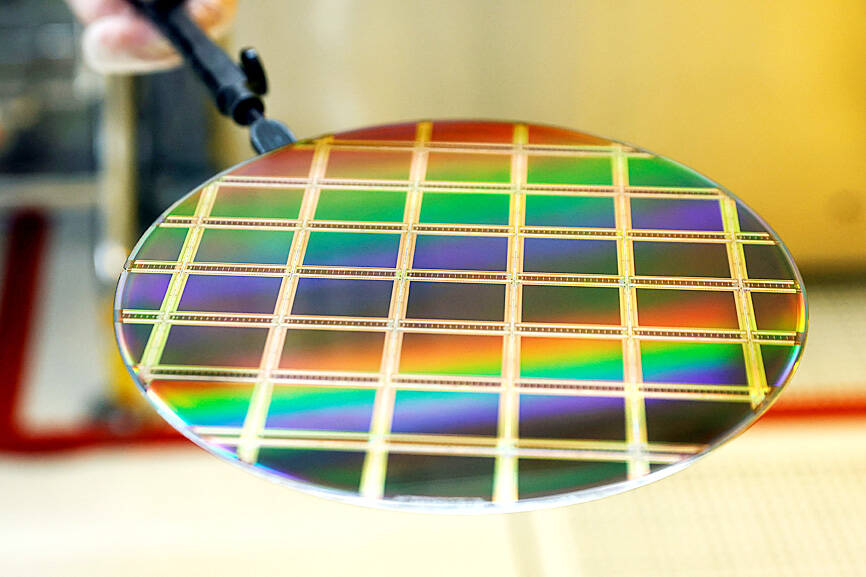US officials from the CHIPS Program Office (CPO) were in Taiwan last week as part of a larger trip to the region to explain funding opportunities for investments in the US, an American Institute in Taiwan (AIT) spokesperson said on Wednesday.
Two senior officials from the CPO, one of two offices administering the US$39 billion budget from the CHIPS Act, joined AIT officials in Taipei and Kaohsiung in informing small Taiwanese suppliers of chip material and equipment about funding opportunities under the CHIPS and Science Act, AIT wrote on Facebook on Friday last week.
The two officials’ “efforts have been instrumental in enhancing these suppliers’ understanding of the available funding opportunities,” it said.

Photo: Reuters
On Wednesday, the spokesperson said that the officials were in Taiwan from Monday to Wednesday last week as part of a trip that also included stops in Japan and South Korea.
“The primary purpose of their visit was to inform semiconductor materials suppliers about the recent Notice of Funding Opportunity released on Sept. 29,” the spokesperson said.
The CPO representatives met with more than 20 semiconductor suppliers in Taipei and Kaohsiung to discuss the latest funding opportunities available via the CHIPS and Science Act, the spokesperson said.
The act, officially signed into law by US President Joe Biden last year, aims to attract semiconductor manufacturers to invest in the US to make it less dependent on overseas chip suppliers, including those in Taiwan.
The legislation provides US$52.7 billion for US semiconductor research, development, manufacturing and workforce development, including US$39 billion in manufacturing incentives.
However, there has been some confusion on what types of companies would be eligible for subsidies under the act, including whether suppliers of semiconductor materials would qualify.
The Notice of Funding Opportunity aims to clarify eligibility, stating that it applies to companies with “a demonstrated ability” to “construct, expand or modernize a facility relating to the fabrication, assembly, testing, advanced packaging, production, or research and development of semiconductors, materials used to manufacture semiconductors or semiconductor manufacturing equipment.”
Reuters on Saturday last week reported that no awards had been issued, and it was still not clear when the US Department of Commerce would announce awards.
It was also reported that US Secretary of Commerce Gina Raimondo told the US Congress that Washington should streamline the process for new projects and make it more efficient and user-friendly.

An essay competition jointly organized by a local writing society and a publisher affiliated with the Chinese Communist Party (CCP) might have contravened the Act Governing Relations Between the People of the Taiwan Area and the Mainland Area (臺灣地區與大陸地區人民關係條例), the Mainland Affairs Council (MAC) said on Thursday. “In this case, the partner organization is clearly an agency under the CCP’s Fujian Provincial Committee,” MAC Deputy Minister and spokesperson Liang Wen-chieh (梁文傑) said at a news briefing in Taipei. “It also involves bringing Taiwanese students to China with all-expenses-paid arrangements to attend award ceremonies and camps,” Liang said. Those two “characteristics” are typically sufficient

The brilliant blue waters, thick foliage and bucolic atmosphere on this seemingly idyllic archipelago deep in the Pacific Ocean belie the key role it now plays in a titanic geopolitical struggle. Palau is again on the front line as China, and the US and its allies prepare their forces in an intensifying contest for control over the Asia-Pacific region. The democratic nation of just 17,000 people hosts US-controlled airstrips and soon-to-be-completed radar installations that the US military describes as “critical” to monitoring vast swathes of water and airspace. It is also a key piece of the second island chain, a string of

A magnitude 5.9 earthquake that struck about 33km off the coast of Hualien City was the "main shock" in a series of quakes in the area, with aftershocks expected over the next three days, the Central Weather Administration (CWA) said yesterday. Prior to the magnitude 5.9 quake shaking most of Taiwan at 6:53pm yesterday, six other earthquakes stronger than a magnitude of 4, starting with a magnitude 5.5 quake at 6:09pm, occurred in the area. CWA Seismological Center Director Wu Chien-fu (吳健富) confirmed that the quakes were all part of the same series and that the magnitude 5.5 temblor was

The Central Weather Administration has issued a heat alert for southeastern Taiwan, warning of temperatures as high as 36°C today, while alerting some coastal areas of strong winds later in the day. Kaohsiung’s Neimen District (內門) and Pingtung County’s Neipu Township (內埔) are under an orange heat alert, which warns of temperatures as high as 36°C for three consecutive days, the CWA said, citing southwest winds. The heat would also extend to Tainan’s Nansi (楠西) and Yujing (玉井) districts, as well as Pingtung’s Gaoshu (高樹), Yanpu (鹽埔) and Majia (瑪家) townships, it said, forecasting highs of up to 36°C in those areas